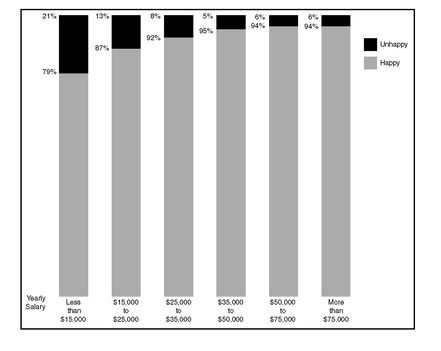
Chapter 3
Keeping Money in Perspective
In This Chapter
✧ Dealing with problems that money causes
✧ Learning to have fun without money
✧ Understanding the relationship between money and happiness
✧ Giving some of what you have
You’ve read a lot in the last two chapters about how important money is, both to our society and in your own life. There’s no question that we need money—and very few people would choose to be without it.
Money buys you stuff you need and stuff you want. It enables us to keep roofs over our heads and to nourish our bodies; and it helps us to enjoy ourselves. It buys designer clothes, cars, and trips to sunny islands. But it doesn’t buy you love, and it doesn’t—on its own merit—make you happy.
The point of this chapter is to get you to put the matter of money into perspective, help you decide how important it is to you, and help you to decide how important it might be to you later in life.
Money Can’t Buy Ya Love
Maybe you’ve heard that old Beatles song called “Can’t Buy Me Love.” Whether or not you like the Beatles’ music, you’ll probably agree that there’s some truth to the lyrics of the song, which repeat, “I don’t care too much for money, for money can’t buy me love.”
A lot of people are attracted to money and to people who have money. There are many people, in fact, who are in love with money; but the real kind of love—the kind that makes you happy and makes you feel complete—isn’t connected to having tons of money. That love comes from caring deeply for someone, whether it’s a boyfriend or girlfriend, a spouse, a parent, a child, or a friend and having that person care for you. It’s sharing what’s inside you and wanting what’s best for the person you love. Those things have little to do with money.

Scary Stuff
Money causes more problems in relationships than almost any other single issue, yet most couples report that they never talk about money until it’s become a problem. Not smart!
Not having enough money to be comfortable certainly can create a great strain on a relationship. Couples and families fight about money all the time and money issues are cited as one of the biggest reasons for trouble within marriages. A recent survey by the financial services giant Citibank found that money problems are the leading cause of divorce in this country.

Imagine That
More than one million American households—about one out of every 100—file for personal bankruptcy protection every year. That means the household is not able to pay its debts and files for protection from creditors. Now that’s a money problem!
Money problems in families aren’t necessarily just between spouses. You’ve no doubt encountered your fair share of family-related money problems, too. It might seem as if you never have enough money, and your parents either don’t help you as much as they could or don’t let you spend your money the way you want to. In many cases parents, teens, and money are as volatile a combination as married couples and money.
According to experts, however, money doesn’t have to become a major stumbling block in any relationship—marital or family. Consider the following guidelines to help manage money issues within your family:
✧ Be respectful. Agree to talk about money issues reasonably and respectfully. This means no shouting, name calling, or blaming one another for problems.
✧ Decide on a money plan right away to avoid possible problems later. If your parents give you an allowance, for instance, work with them to establish some guidelines about how you’ll spend it. Maybe you’ll decide that half of what you get is yours to spend however you want and the other half is designated for certain expenses or savings. If you earn your own money, decide with your parents on whether they’ll supplement your income, how much you’ll spend, how much you’ll save, and so forth.
✧ Have a clear understanding of your family’s money situation and understand its limitations. If your best friend gets $40 a week plus money for all her clothes and school supplies, it doesn’t necessarily figure that you should, too.
✧ Never let money become more important than relationships.
Many people who have lost someone they love say they’d gladly give up all their money to have him or her back. Parents who have endured the agonizing ordeal of having their children kidnapped willingly arrange to have their lives’ savings handed over in exchange for getting their child back. Most people who are told they’re suffering from terminal diseases and have only a short time to live would be willing to give all the money they have if they could only have their health restored. Money is important, but it really can’t buy you love.
Having Fun—Free
What’s a teenager to do? It costs $7 or $8 to get into a movie. The $15 it used to take to fill up Mom’s gas tank now fills it only two-thirds of the way, thanks to skyrocketing gas prices. A grand latte at Starbucks goes for nearly $3. Soda machines eat up dollar bills and don’t give change. The paperback you’ve been wanting to read might cost you $12.95. Even a burger, Coke, and fries at McDonald’s can cost you $5 or more. Just getting through an ordinary day can be super expensive.
On the other hand, it doesn’t need to be. Spending lots of money might be more of a habit than a necessity, and there are a lot of ways that you can have fun without spending a lot of money, or any money at all.

Money Matters
Check out www.simpleliving.com for lots of good ideas about having fun without spending a lot of money.
I know a group of five teenagers who get together every Friday or Saturday night for pizza and a video. They meet at one of their houses, have pizza delivered, and watch a video. They always end up having a great time together, and it costs each of them less than $5.
Let’s have a look at some other things you can do free or for just a little money, whether on a Friday night, Saturday afternoon, or any other time:
✧ Get outside. There are still lots of outdoor activities that won’t cost you a penny. Grab some friends and take a hike in a nearby state park. If you’re interested in outdoorsy things such as birds or wildlife, these places often offer free nature programs. Find a nearby lake to swim in or head for a friend’s pool.
✧ Check out free stuff going on in your town. Most communities offer free activities such as concerts or shows. Look up your town or city’s Web site or check out the weekend section of your local newspaper to find out what’s going on that’s free.
✧ Hang out at the library. If you haven’t visited a public library for a while, you should. Many libraries now offer Internet access, more magazines than you can imagine, videos that you can borrow free, books on tape, and more.
✧ Work to have fun. Believe it or not, working together with a group can be a lot of fun, and profitable as well. Get some friends and some rakes and put the word out that you’re available for fall clean-up jobs. There are an awful lot of aging or busy people around who would love to have some reliable, not-too-expensive help. You’d have fun and earn some money as well.
You probably can come up with your own ideas for having free or cheap fun if you put your mind to it. Often, imagination is more important than money when it comes to entertainment or amusement.
Can Money Really Make You Happy?
Many people think that if they only had more money, they’d be better off and happier than they already are. “If I only had $20 more a week, I’d be so much happier,” one person might say; or, “If I only made $300,000 a year instead of $200,000, I know I’d be a lot happier.” You probably can figure that if Jack’s not happy with $200,000 a year, he’s probably not going to be happy with $300,000 either.
Studies have shown again and again that people who have the material necessities of life—clean water, shelter, breathable air, enough food, and adequate clothing—are happier than those who don’t. Once those needs have been met, however, people with more are not necessarily any happier.
Dr. David Myers, a psychology professor at Hope College in Michigan and the author of The Pursuit of Happiness: Who Is Happy—And Why, says that people mistakenly think the only way to be rich is to have great financial wealth. If financial wealth is your goal and you don’t have it, chances are you won’t be happy because you’ll feel that you’ve failed. If you think about and appreciate what you’ve got and consciously try to stop wanting more and more, you’ll have a greater chance at achieving happiness, Myers says.
If you think about it a little, you’ll probably realize that Myers is right. If you “need” the latest style of Nikes even though they cost $125, refuse to wear anything but Tommy or Nautica, and sneer at anybody who drives a car that’s more than two years old, you’re setting yourself up for big problems—unless you have access to lots and lots of money.
If, on the other hand, you think the $40 sneaks you get on sale are just fine, you like the way you look in nondesigner jeans and tees, and you think any car is cool as long as it gets you where you need to go, you’re probably a pretty happy person. Someone with fewer needs who can enjoy what he or she has without always wanting more is almost sure to be happier than someone who lives in a constant state of “gotta have, gotta get.”

Scary Stuff
Since 1960, the rate of violent crime has quintupled in the United States. The divorce rate has doubled and the teen suicide rate has tripled. We have soaring rates of depression. As a country, we’re wealthier. But happier? It doesn’t seem so.
Income and Happiness
Look at the following chart showing data from a survey conducted by the University of Chicago’s National Opinion Center. It divides the nation’s population into six groups and shows what percentage of each group is happy and what percentage is unhappy.
What do all those numbers mean? According to the University of Chicago’s findings, people who don’t have much money ($15,000 might sound like a lot, but it isn’t if it’s all you’ve got to live on) are more likely to be unhappy than those earning more. However, it also shows that people who earn more than $75,000 a year aren’t much happier than those who earn between $25,000 and $35,000. This seems to support research showing that once basic needs are met, additional money doesn’t guarantee additional happiness—or any happiness at all, for that matter. Of course, you usually can find research to contradict research, and surveys and research supporting this topic are no exception.

Less Is More?
Joe Dominguez and Vicki Robin, the authors of Your Money or Your Life, surveyed more than 1,000 people from the United States and Canada when researching for their book. They asked each person to rank him- or herself on a scale of one to five, with one being “miserable,” three being “can’t complain,” and five being “joyous.”
The authors found no correlation between income and happiness. In their survey, in fact, those who earned less than $1,000 a month reported being slightly happier than those who earned more than $4,000. This is in contrast to the University of Chicago’s numbers, which claims that more people of very limited means are unhappier than those of wealth. Go figure.

Scary Stuff
Many people—especially those just entering the workforce—are willing to take jobs they hate if the jobs pay well. When you consider that a job consumes at least one-third of your weekdays, that’s an awful lot of life to waste for a good salary.
One thing we do know is that, as a country, we’re no happier now than we were 40 or 45 years ago, despite great increases of possessions. The number of people who consider themselves to be “very happy” has leveled off or declined since 1957. This is despite the fact that we consume nearly twice as much in resources today than we did then, when the average size of a house was much, much smaller, and hardly any families had more than one car.
Let’s try to put this money and happiness thing in perspective. We live in a country of great wealth. To somebody living in India, for instance, $15,000 a year would be a tremendous amount of money. Americans tend to have a different view on money and possessions because we have so much more than almost everybody else in the world. Quite frankly, we’re spoiled. The purpose of this book, however, is not to make you feel guilty because of what you’ve got or to lecture you on learning to think globally. If you can learn to appreciate what you’ve got, manage your money well, and try to avoid constantly wanting more and more, there’s a really good chance that you’ll be happy and contented.

Imagine That
Two-thirds of all the people in the world have a standard of living that’s just 20 percent of the U.S. average. That means that the average American is five times better off financially than two out of every three people in the world.
Money and Social Responsibility
To some people, money and social responsibility go hand in hand. To others, the two things are completely unrelated. There are a lot of definitions of social responsibility and a lot of people and groups who have bought into the concept. The Internet is loaded with groups who link themselves with social responsibility.
So, why are all these groups anxious to be known as socially responsible? Because it’s trendy, or because they realize it’s what we need to do to sustain our society and help the rest of the world? No doubt, each of these groups and the numerous other ones that claim to be socially responsible have their own agendas and their own ideas of what social responsibility means.
Personally, I think that social responsibility is understanding your place in the world, doing what you can to help sustain others, and respecting and protecting your environment.
This doesn’t mean that you need to give ten percent of whatever money you have to a charity or that you shouldn’t drive or ride in a car. Being socially responsible doesn’t mean you need to join a group of monks and sleep on a hard bed for the rest of your life or that you should dispose of all your belongings. It simply means being aware of and appreciating what we have and helping others when we can.
People of great wealth are pressured to be socially responsible and share what they have. Computer guru Bill Gates and his wife founded the Bill and Melinda Gates Foundation and endowed it with more than 17 billion dollars to support philanthropic efforts in the areas of global health and learning. At the beginning of 2000, the foundation had committed nearly $700 million to various agencies.
Of course, Bill Gates’s net worth is estimated at more than 80 billion dollars, so what’s a few hundred million here and there? The point, though, is that if you have, you might want to consider giving at least a small part of what you have to those who don’t.
Helping Out Who You Know
Take a look around your community and you’re almost sure to find people who have less than you do. If you’re inclined to do so, there’s probably a place not far from you that would be happy to have your help. It might be a homeless shelter, or a soup kitchen, or a place where people who don’t have much money can buy used clothes and furniture. You don’t have to give money in order to help out and be socially responsible. A few hours of your time or donations of clothing or other items you no longer use count, too.
Giving to People You’ll Never See
My daughter and I recently participated in a Crop Walk, an event sponsored by Church World Service. We walked five miles to raise money for people who aren’t as fortunate as we are. We got sponsors to pay us for each mile we walked, contributed some money ourselves, and trekked along, knowing that most of the money we raised would go to people we would never know or see. We don’t know where the money we raised will be used, or who will get it. All we know is that in a small way we were able to help someone who has less than we do.
Many, many people practice social responsibility in small ways all the time. Those with great wealth are able to impact many people when they decide to share what they have. All of us, however, regardless of how much money we have, probably can think of some way to help out someone who has less. Trying to keep money and its importance in a reasonable perspective will help to better appreciate and enjoy what you have, while helping you to remember what others might not have.
The Least You Need to Know
✧ Money-related problems are among the most common that crop up between married couples and in families.
✧ With a little creativity and ingenuity, you can learn to have a lot of fun without spending much money.
✧ Opinions vary, but most research indicates there’s no clear link between having a lot of money and being happy.
✧ Social responsibility is caring for the world you live in and the people with whom you share it.
✧ You don’t need to have a lot of money to be able to share a bit with those who are less fortunate.
..................Content has been hidden....................
You can't read the all page of ebook, please click here login for view all page.
